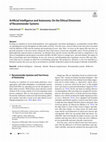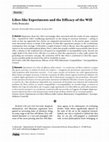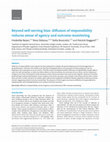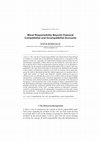Papers by Sofia Bonicalzi

Topoi
Feasting on a plethora of social media platforms, news aggregators, and online marketplaces, reco... more Feasting on a plethora of social media platforms, news aggregators, and online marketplaces, recommender systems (RSs) are spreading pervasively throughout our daily online activities. Over the years, a host of ethical issues have been associated with the diffusion of RSs and the tracking and monitoring of users’ data. Here, we focus on the impact RSs may have on personal autonomy as the most elusive among the often-cited sources of grievance and public outcry. On the grounds of a philosophically nuanced notion of autonomy, we illustrate three specific reasons why RSs may limit or compromise it: the threat of manipulation and deception associated with RSs; the RSs’ power to reshape users’ personal identity; the impact of RSs on knowledge and critical thinking. In our view, however, notwithstanding these legitimate concerns, RSs may effectively help users to navigate an otherwise overwhelming landscape. Our perspective, therefore, is not to be intended as a bulwark to protect the sta...
Routledge eBooks, Dec 14, 2022

Journal of Applied Philosophy
ABSTRACTIn this article, we take the case of racism in contemporary Italy as a starting point for... more ABSTRACTIn this article, we take the case of racism in contemporary Italy as a starting point for a discussion about moral responsibility for racism in cases where ignorance is involved. We focus on the issue of the normalization of racism and its contribution to different forms of ignorance to assess the extent to which these might potentially mitigate judgments of responsibility for racism, thereby grounding an Exculpatory Stance. After illustrating the phenomenon of the normalization of racism and offering an outline of how the normalization of racism contributes to ignorance, we argue against the Exculpatory Stance by appealing to a socially situated variety of capacitarian approach to the epistemic condition of moral responsibility. This approach provides us with the tools to claim that the moral ignorance favored by the normalization of racism does not mitigate judgments of individual responsibility. Finally, we point out that the interdependence of individual responsibility a...
Rivista Di Storia Della Filosofia, 2012
Phenomenology and Mind, 2014
Promising to be the best companion for scientific naturalism, compatibilism usually espouses a re... more Promising to be the best companion for scientific naturalism, compatibilism usually espouses a reductivist event-causal background. lynne Baker challenges this view, arguing that compatibilist moral responsibility also requires an irreducible "first-person perspective". in this paper i will provide some arguments for claiming that (frankfurttype) event-causal accounts cannot avoid making reference to some sort of agential properties. in the second part, i will present the proposals formulated by nelkin and Markosian for defending agent-causation, before returning to the theme with which i began, this time considering frankfurt's view in the light of Baker's reading.

Rivista Internazionale di Filosofia e Psicologia, 2015
: Skepticism about free will is increasingly often associated with the results of some empirical ... more : Skepticism about free will is increasingly often associated with the results of some empirical tests – launched by Libet’s trailblazing experiments on the timing of conscious intentions – aiming to teach us that our apparently free choices are originated unconsciously. In the present paper, I present some theoretical reasons to doubt if the upshots of Libet-like experiments purport to the revolutionary consequences they envisage. I will isolate a couple of points I wish to discuss, since they gained much attention in the recent philosophical debate. First, I claim that actually available neuroscientific data do not offer a solution to the traditional free will quarrel in compatibilist or incompatibilist terms. Second, one might doubt if the kind of free will that is at stake in Libet-like experiments is what really matters for grounding our normative concepts. My conclusion will be that what is scrutinised in Libet-like experiments resembles palely the kind of free will we would l...

The chapter considers recent attempts to derive a prescription from a description or, more genera... more The chapter considers recent attempts to derive a prescription from a description or, more generally, from a matter of fact on the basis of neuroscience findings about free will and brain functioning. But it is argued that—within the framework of the attempted naturalization of morals— we must face improper inferences from scientific descriptions and explanations to normative concepts. The inferences taken into consideration are improper first of all because relevant knowledge is insufficient or insufficiently corroborated. Secondly, inferences are improper because, as we attempt to argue, it is not legitimate to move from descriptions of average phenomena to general prescriptions. This is not motivated only by the impossibility of deriving ought from is contained in the literal interpretation of Hume’s Law, but also because of the very nature of normative judgments expressed by human beings.
Free Will, Causality, and Neuroscience, 2019
This is an open access chapter distributed under the terms of the CC-BY-NC 4.0 License.
Ethical Theory and Moral Practice, 2020
Frontiers in Psychology, 2019
There are few concepts as relevant as that of intentional action in shaping our sense of self and... more There are few concepts as relevant as that of intentional action in shaping our sense of self and the interaction with the environment. At the same time, few concepts are so elusive. Indeed, both conceptual and neuroscientific accounts of intentional agency have proven to be problematic. On the one hand, most conceptual views struggle in defining how agents can adequately exert control over their actions. On the other hand, neuroscience settles for definitions by exclusion whereby key features of human intentional actions, including goal-directness, remain underspecified. This paper reviews the existing literature and sketches how this gap might be filled. In particular, we defend a gradualist notion of intentional behavior, which revolves around the following key features: autonomy, flexibility in the integration of causal vectors, and control.
Behavioral and Brain Sciences, 2018
Collaborativism is the view that moral reasoning is better when it is socially embedded. We propo... more Collaborativism is the view that moral reasoning is better when it is socially embedded. We propose that, when people take part in dialogic exchanges, they align in ways that open up novel avenues for sharing values and rationality criteria and, therefore, for exercising responsible agency. The hypothesis that collaborative interactions unfold through the alignment of minds and bodies helps articulate Doris's participatory approach to morality.

Social Cognitive and Affective Neuroscience, 2016
Diffusion of responsibility across agents has been proposed to underlie decreased helping and inc... more Diffusion of responsibility across agents has been proposed to underlie decreased helping and increased aggression in group behaviour. However, few studies have directly investigated effects of the presence of other people on how we experience the consequences of our actions. This EEG study investigated whether diffusion of responsibility simply reflects a post-hoc self-serving bias, or rather has direct effects on how we process the outcomes of our actions, and our experience of agency over them. Participants made voluntary actions whose outcomes were more or less negative. Presence of another potential agent reduced participants' sense of agency over those outcomes, even though it was always obvious who caused each outcome. Further, presence of another agent reduced the amplitude of feedback-related negativity evoked by outcome stimuli, suggesting reduced outcome monitoring. The presence of other agents may lead to diffusion of responsibility by weakening the neural linkage between one's actions and their outcomes.

Prolegomena Casopis Za Filozofiju, Jun 28, 2013
The concept of "moral responsibility" has almost always been defined in relation to a certain ide... more The concept of "moral responsibility" has almost always been defined in relation to a certain idea of metaphysical freedom and to a conception of the physical world. So, classically, for indeterminist thinkers, human beings are free and therefore responsible, if their choices are not defined by a previous state of the world but derive from an autonomous selection among a set of alternatives. Differently, for the majority of determinist philosophers (the so-called "soft compatibilists"), the only form of freedom we need has to be identified with freedom of the conduct, considered as opposite to any form of coercion. Some argue that, given the truth of determinism and the related suppression of concepts such as "guilt" and "praise", or "merit" and "demerit", morality could survive just as a utilitarian tool, even though this seems to be in conflict with our deepest feelings and practices. Considering some revisionist approaches of moral responsibility in connection with classical positions (synthetically presented in the first part of the paper), I will reconstruct some of the attempts to release responsibility from the thematisation of freedom, exploring the possibility of redefining it as an independent concept. My conclusion is that the focus on the choice-action process and on the characteristics of the "self", avoiding reference to alternative scenarios, could be a good starting point for elaborating a conception of what really counts for our moral life-even though, in the end, this could entail the abandonment of the traditional concept of responsibility itself.

In this collection of essays, several authors, belonging to different generations and philosophic... more In this collection of essays, several authors, belonging to different generations and philosophical traditions, discuss ample ethical and metaethical issues together with their relations to questions of applied ethics. The volume provides a wide account of some of the main topics in these fields, thus dealing with nearly everything that human beings hold as valuable. Expert scholars and young researchers contribute to this virtual symposium, reframing the current philosophical debates about the definition and the history of the concept of Naturalism, the different declinations of Kantian Constructivism, the functioning of Rational Choice Theory, the complex role played by Neuroscience in redefining the contours of ethical theories and bioethics, the puzzles of Deontic Logic, and the bases of Animal Ethics. Divided into three sections, presented by comprehensive introductions by Sofia Bonicalzi, Leonardo Caffo and Mattia Sorgon, the present collection includes contributions by Martina Belmonte, Michele Borri, Luciana Ceri, Guglielmo Feis, Matteo Grasso, Andrea Lavazza, Sarah Songhorian, and Francesca Vitale. Each author develops a distinctive and independent position, while critically engaging with the central themes of contemporary reflection. This new, major study will benefit moral philosophers, philosophers of science, and scientists concerned with bioethics, while at the same time stimulating and challenging anyone who is curious about the nature and the origins of ethical and metaethical enquiries.











Uploads
Papers by Sofia Bonicalzi
Expert scholars and young researchers contribute to this virtual symposium, reframing the current philosophical debates about the definition and the history of the concept of Naturalism, the different declinations of Kantian Constructivism, the functioning of Rational Choice Theory, the complex role played by Neuroscience in redefining the contours of ethical theories and bioethics, the puzzles of Deontic Logic, and the bases of Animal Ethics.
Divided into three sections, presented by comprehensive introductions by Sofia Bonicalzi, Leonardo Caffo and Mattia Sorgon, the present collection includes contributions by Martina Belmonte, Michele Borri, Luciana Ceri, Guglielmo Feis, Matteo Grasso, Andrea Lavazza, Sarah Songhorian, and Francesca Vitale. Each author develops a distinctive and independent position, while critically engaging with the central themes of contemporary reflection.
This new, major study will benefit moral philosophers, philosophers of science, and scientists concerned with bioethics, while at the same time stimulating and challenging anyone who is curious about the nature and the origins of ethical and metaethical enquiries.